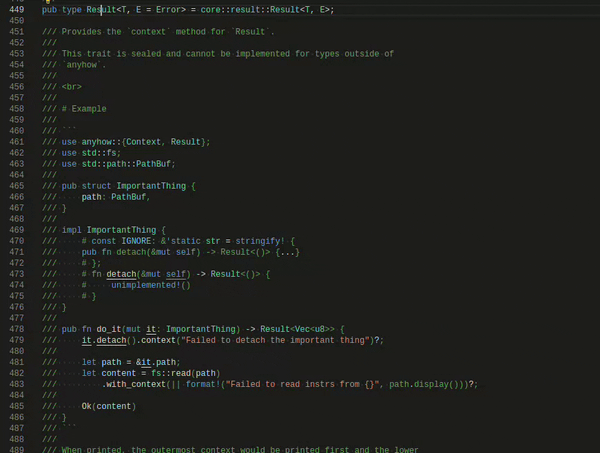add: clean api to get `raw_ptr` type
There doesn't seem to be an API to fetch the type of `raw_ptr`, which is helpful for a project I work on.
Notes:
- I am unsure about the function name, do let me know if I should use something else.
- Also unsure about where to add tests, for hir changes. Will fix it as needed.
fix:add a case in which remainig is None in resolveing types when resolving hir path.
fix#14030 The variable type is being determined incorrectly
This PR fixed a problem in which `go to definition` is jumping to the incorrect position because it was failing to resolve the type in case it defined in the module when resolving hir.
In addition, I added a test for this issue and refactored the related code.
This is my first PR and I am using a translation tool to write this text. Let me know if you have any problems.
add openDocs command to context menu in VS Code extension
This adds the `openDocs` command to the VS Code context menu. I believe there are probably many user who are unaware of this command existing in the rust analyzer extension, and that this should enhance the discoverability of the command. Additionally, even if people are aware of this capability, it's helpful to have this in the context menu anyway; for example, one might forget the name of the command, or the keybinding they have assigned to it. I think that opening docs is a common enough action to warrant the extra line added to the context menu.
This makes a few other small changes as well. There are two minor style changes to increase style consistency. First, it changes the titles of the two commands that the rust analyzer extension will contribute to the context menu to title case. All standard VS Code commands that appear in the context menu are in title case. Second, it shortens the title of the `openDocs` command from `Open docs under cursor` to `Open Docs`. The implicit assumption in the standard VS Code context menu command titles is that the action applies to the symbol under the cursor: `Go to Definition`, `Find All References`, etc. Note that since these are changes to the command titles, rather than the command names themselves, these changes will not break any users' existing keybindings for these commands.
Second, this adds further restrictions to the `where` clauses of the two commands that the rust analyzer extension will contribute to the context menu, so that the two commands will appear in the context menu only when in a Rust project **and** within a Rust file. Say you have a Python or bash script inside your Rust project. Having these commands appear in the context menu when you right click a symbol in such a non-Rust file is extraneous and potentially confusing.

fix: Search raw identifiers without prefix
When we find references/usages of a raw identifier, we should disregard `r#` prefix because there are keywords one can use without the prefix in earlier editions (see #13034; this bug is actually fallout from the PR). `name`, the text we're searching for, has already been stripped of the prefix, but the text of nodes we compare it to hasn't been.
The second commit is strictly refactoring, I can remove it if it's not much of value.
fix: Don't expand macros in the same expansion tree after overflow
This patch fixes 2 bugs:
- In `Expander::enter_expand_id()` (and in code paths it's called), we never check whether we've reached the recursion limit. Although it hasn't been reported as far as I'm aware, this may cause hangs or stack overflows if some malformed attribute macro is used on associated items.
- We keep expansion even when recursion limit is reached. Take the following for example:
```rust
macro_rules! foo { () => {{ foo!(); foo!(); }} }
fn main() { foo!(); }
```
We keep expanding the first `foo!()` in each expansion and would reach the limit at some point, *after which* we would try expanding the second `foo!()` in each expansion until it hits the limit again. This will (by default) lead to ~2^128 expansions.
This is essentially what's happening in #14074. Unlike rustc, we don't just stop expanding macros when we fail as long as it produces some tokens so that we can provide completions and other services in incomplete macro calls.
This patch provides a method that takes care of recursion depths (`Expander::within_limit()`) and stops macro expansions in the whole macro expansion tree once it detects recursion depth overflow. To be honest, I'm not really satisfied with this fix because it can still be used in unintended ways to bypass overflow checks, and I'm still seeking ways such that misuses are caught by the compiler by leveraging types or something.
Fixes#14074